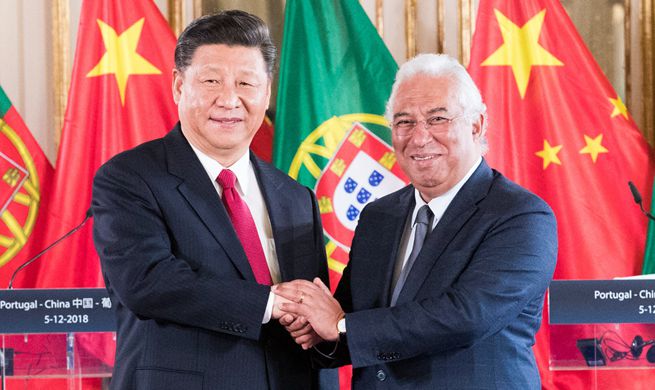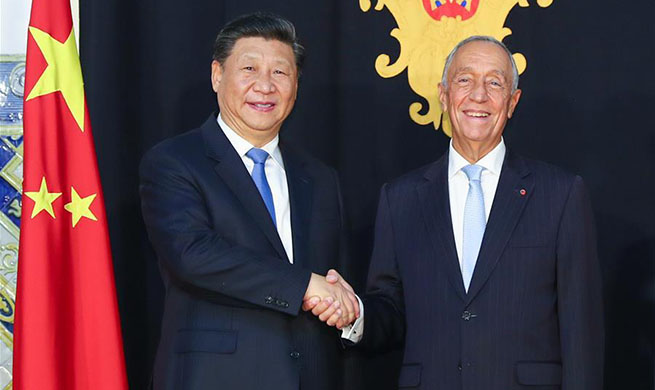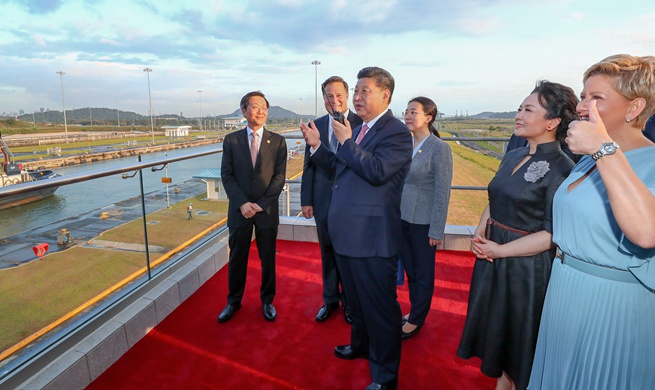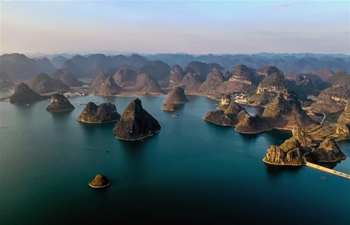by Xinhua writers Jin Jing, Zhang Jiawei, Zhang Zhang
KATOWICE, Poland, Dec. 5 (Xinhua) -- Climate activists have called for bold and rapid actions by world leaders to tackle climate change as a report showed Wednesday that global carbon emissions are set to hit an all-time high in 2018.
According to researchers at the University of East Anglia (UEA) and the Global Carbon Project, global carbon emissions are expected to reach 37.1 billion tonnes of CO2 in 2018.
The 2018 global emission is expected to rise by more than 2 percent from last year, driven by a solid growth in coal use and sustained growth in oil and gas use, said the report, urging actions by governments at the ongoing 24th Conference of the Parties (COP 24) to the United Nations Framework Convention on Climate Change (UNFCCC) in Katowice.
CALLS FOR ACTION
"To limit global warming to the Paris Agreement goal of 1.5°C, CO2 emissions would need to decline by 50 percent by 2030 and reach net zero by around 2050," said lead researcher Corinne Le Quere, director of the Tyndall Center for Climate Change Research and Professor of Climate Change Science and Policy at UEA.
"We are a long way from this and much more needs to be done," Le Quere said.
CO2 emissions have now risen for a second year, after three years of little-to-no growth from 2014 to 2016, according to the report.
"The growing global demand for energy is outpacing decarbonisation for now," said Le Quere, "We need strong policy and economic support for rapid deployment of low carbon technologies to cut emissions across the energy and transport sectors, from buildings and from industry."
The two-week COP24, which opened Sunday, aims to finalize the implementation guidelines of the landmark Paris deal and provide clarity on how to carry out the accord fairly for all participating countries.
Adopting the guidelines is crucial for putting the Paris deal into practice as it will enable and encourage climate actions at all levels worldwide and demonstrate the global commitment to tackling the pressing challenge.
While countries including China and France are fully committed to finalizing the guidelines, a great deal of work remains to be done in Katowice.
CHINA TAKES THE LEAD
Despite grave concerns over rising emissions, the research team say energy trends are changing with coal use decreasing in many parts of the world and an explosion in wind and solar energy.
The report noted that even though China's emissions have grown an estimated 4.7 percent in 2018, its energy from renewables is growing by 25 percent per year.
Thanks to increased investment in green energy, China's carbon intensity, or the amount of carbon dioxide emissions per unit of GDP, declined by 46 percent by 2017 from 2005 levels, meeting the target ahead of schedule of a 40-45 percent drop by 2020, according to the latest report by the Chinese Ministry of Ecology and Environment.
According to Xie Zhenhua, China's special representative for climate change, China is well positioned to meet the target of peaking carbon dioxide emissions by 2030, and even accomplishing that sooner than planned.
Not only has China takes the implementation of the Paris Agreement as an inherent part of its own sustainable development, it is also taking solid actions to help developing countries deal with climate challenges.
China has in 2015 pledged a package of 3.1 billion U.S. dollars to the South-South Cooperation Fund on Climate Change for developing countries.
It has also donated energy conserving or renewable-energy facilities as well as climate change surveillance instruments, and provided funds, technologies and capacity building to the least developed countries, small-island countries and African countries.
In the just concluded G20 summit, China, along with France, reaffirmed its highest political commitment to the effective and transparent implementation of the Paris Agreement.
COMMON BUT DIFFERENTIATED RESPONSIBILITIES
Among the ten biggest emitters in 2018, five are developed countries, namely the United States, Japan, Germany, South Korea and Canada, according to the UEA report.
Emissions in the United States account for 15 percent of the global total, and set to have grown about 2.5 percent in 2018, said the report.
"While renewables are rising fast, it is not yet enough to reverse global emissions trends. The rapid actions needed to address climate change also need to be fair to all generations," Le Quere said.
"Fair mean responsibility. It means equity. It means that the poor must not pay the price of the adjustments. Everybody has to take action but the poor should not be burdened," said Meenakshi Raman, legal advisor of Coordinator Climate Change Programme for Third World Network, an independent non-profit research and advocacy organization.
Much of the climate challenges the world is facing today are largely because many developed countries did not have the constraint on carbon emissions, she said, adding that the developed countries are not doing enough in accordance with their responsibilities in this regard.
Meanwhile, China, as the world's largest developing country, is showing "real leadership" in tackling climate change, she said.
(Xinhua reporters Shi Zhongyu also contributed to this story)













